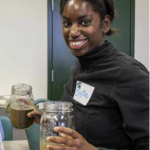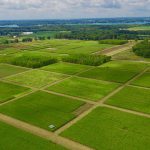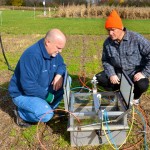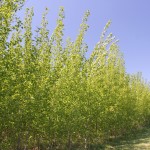KBS LTER scientists were recently featured in the latest issue of MSU's AgBioResearch FUTURES magazine. The article begins, "Like most students at the Michigan State University (MSU) W. K. Kellogg Biological Station (KBS), which is renowned for advancements in ecological science and evolutionary biology, Christine Sprunger arrived eager to roll up her sleeves and get her hands dirty — literally. “When I took my first soils class as a sophomore at the University of Washington, I just kind of fell in love with the topic,” said Sprunger, now pursuing a dual doctoral degree in crop and soil
CO2 flux towers help assess the sustainability of biofuels
This news piece by KBS LTER volunteer and retired journalist Bill Krasean. If the United States is to develop sustainable biofuels such as cellulosic ethanol as alternatives to grain-based ethanol and the burning of climate-changing fossil fuels, there are still many questions yet to be answered. Key among those questions is where best to grow biofuel crops without sacrificing valuable farm and forestland, says Jiquan Chen, Distinguished University Professor in Environmental Science at the University of Toledo and investigator in the U.S. Dept. of Energy’s (DOE) Great Lakes Bioenergy
Small seedlings help tell a big story: reflections from an undergraduate researcher
Each summer the KBS LTER supports students to participate in the Research Experiences for Undergraduates (REU) program, funded by the National Science Foundation. This is part of a larger REU and intern program at KBS. Caitlyn Byron, a senior at Baldwin Wallace University in Ohio, writes about her REU experience working with KBS LTER scientists Drs. Tim Dickson and Kay Gross. ~~~ It is a beautiful morning in southwest Michigan, so I pause to take it in as I step out of my apartment. The birds are chirping, I can hear boats zooming across Gull Lake, and the sun is peaking through the
It’s not dirt, it’s SOIL: reflections from an undergraduate researcher
Each summer the KBS LTER supports students to participate in the Research Experiences for Undergraduates (REU) program, funded by the National Science Foundation. This is part of a larger REU and intern program at KBS. Monica Cooper, a senior at Kalamazoo College, writes about her REU experience working with KBS LTER scientists Dr. Sarah Emery and Brad Gottshall.~~~~~~~~~~~~~~~~ It wasn't often that I thought about dirt before starting my Research Experiences for Undergraduates (REU) this past June. Since then, I have learned that it’s called soil, never dirt, and I have been learning a bit
KBS LTER research featured in National Geographic
KBS LTER scientists Phil Robertson and Sieglinde Snapp are featured in "Fertilized World," an article examining commercial fertilizer use around the globe, in the May 2013 issue of National Geographic magazine. Read the article online here.
Gi-normous global issues, one little person, and a community of collaboration
Our congratulations to Bonnie McGill, KBS LTER graduate student, who was recently awarded a National Science Foundation (NSF) Graduate Research Fellowship. We’ve asked Bonnie to write a blog post about her research. Enjoy! The earth and our society face such “gi-normous” problems like climate change, pollution, biodiversity loss, food security—what can a little person like me do about it? This question has been rolling around inside my head for the last 11 years or so, and it seems like my quest is starting to gain more traction. I’ve narrowed my research focus to water quality,
New tools to measure greenhouse gases
KBS LTER volunteer and retired journalist Bill Krasean reports on new tools we are using to measure greenhouse gases from agricultural lands. His piece was published today in the National LTER Newsletter and reprinted here. When the plants and microbes exhale on the 1,700-acre W. K. Kellogg Biological Station’s hundreds of plots, Sven Bohm, Kevin Kahmark and a team of fellow researchers sniff their breath. Not literally, of course. Rather, using the latest and fastest instruments and software -- much of it based on their own ingenuity -- the team continually samples and analyzes gases
Graduate Student Spotlight – Megan Woltz
Name: J. Megan Woltz Hometown: Afton, NC Degree: Ph.D. Candidate in Entomology & Ecology, Evolutionary Biology, and Behavior, Michigan State University Dissertation advisor: Professor Doug Landis, Department of Entomology, MSU Graduate Research Focus: As a landscape agroecologist, I am primarily interested in understanding how landscape heterogeneity influences the provision of ecosystem services in agroecosystems. In other words, I want to know how the way we design the landscapes around us affects things that we humans care about, such as clean water, wildlife habitat, and air
Nature paper highlights KBS LTER long-term data sets
KBS LTER scientists published a paper in the journal Nature today showing how lands that are unsuited for food crops - called marginal lands - can help to meet our nation's alternative energy production goals. By using over 20 years of KBS LTER data, coupled with innovative modeling techniques, the researchers documented that marginal lands can contribute greatly to transportation energy needs while providing climate and conservation benefits. Read more about this research from MSU News and from the National Science Foundation.
KBS LTER and Malawi partnership addresses food security
The W.K Kellogg Biological Station Long-term Ecological Research (KBS LTER) program of Michigan State University (MSU) is partnering with the University of Malawi (UNIMA) in southeast Africa on a new project. The goal is to address Malawi’s agricultural development and food security, two pressing domestic policy issues in a country relying heavily on agriculture. The National Science Foundation (NSF) and the United States Agency for International Development (USAID) cooperated to launch a new funding program; Partnerships for Enhanced Engagement in Research (PEER). As a competitive grant







